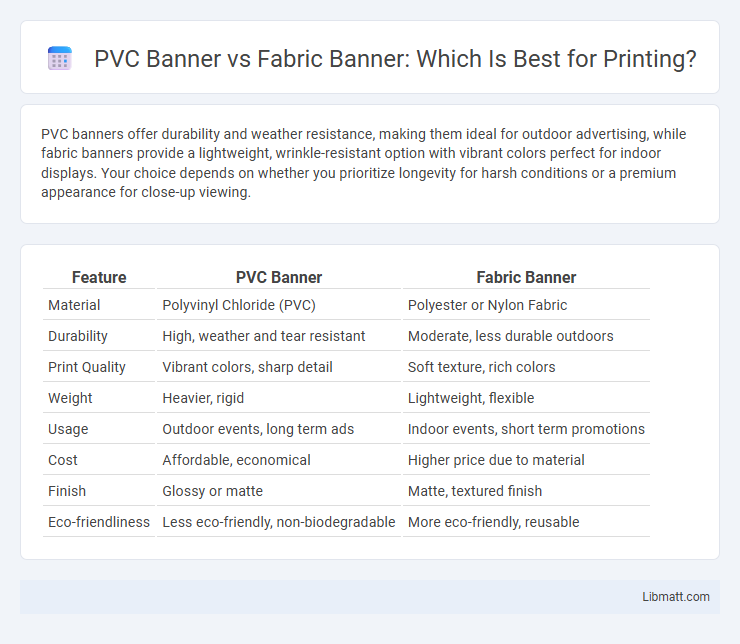PVC banners offer durability and weather resistance, making them ideal for outdoor advertising, while fabric banners provide a lightweight, wrinkle-resistant option with vibrant colors perfect for indoor displays. Your choice depends on whether you prioritize longevity for harsh conditions or a premium appearance for close-up viewing.
Table of Comparison
| Feature | PVC Banner | Fabric Banner |
|---|---|---|
| Material | Polyvinyl Chloride (PVC) | Polyester or Nylon Fabric |
| Durability | High, weather and tear resistant | Moderate, less durable outdoors |
| Print Quality | Vibrant colors, sharp detail | Soft texture, rich colors |
| Weight | Heavier, rigid | Lightweight, flexible |
| Usage | Outdoor events, long term ads | Indoor events, short term promotions |
| Cost | Affordable, economical | Higher price due to material |
| Finish | Glossy or matte | Matte, textured finish |
| Eco-friendliness | Less eco-friendly, non-biodegradable | More eco-friendly, reusable |
Introduction to PVC and Fabric Banners
PVC banners are made from durable polyvinyl chloride, providing a waterproof and weather-resistant solution ideal for outdoor advertising. Fabric banners utilize polyester or nylon materials, offering a lightweight, wrinkle-resistant, and vibrant print surface suited for indoor or short-term use. Your choice between PVC and fabric banners depends on factors like durability, display environment, and visual appeal.
Material Composition and Properties
PVC banners are made from polyvinyl chloride, a durable plastic material known for its water resistance, UV resistance, and tear strength, making it ideal for outdoor use. Fabric banners typically consist of polyester or woven polyester fibers, offering a lightweight, flexible, and wrinkle-resistant surface with vibrant print quality and better breathability. The choice between PVC and fabric depends on the need for weatherproof durability versus a more elegant, reusable textile appearance.
Durability and Weather Resistance
PVC banners offer superior durability and weather resistance due to their waterproof and UV-resistant properties, making them ideal for long-term outdoor use. Fabric banners, while lightweight and visually appealing, tend to absorb moisture and may fade or deteriorate faster under harsh weather conditions. Choosing a PVC banner ensures your message remains vibrant and intact despite exposure to wind, rain, or sunlight.
Print Quality and Color Vibrancy
PVC banners offer high print clarity with sharp, vivid images due to their smooth, non-porous surface that enhances ink adhesion and color vibrancy. Fabric banners provide a softer, more natural texture that can slightly diffuse colors, resulting in a more subdued but elegant finish with excellent color retention under various lighting conditions. Both materials support high-resolution printing, but PVC is preferred for bold, eye-catching visuals while fabric is chosen for a refined, matte aesthetic.
Weight and Portability
PVC banners typically weigh more due to their dense vinyl material, making them less portable and bulkier to transport compared to fabric banners. Fabric banners are lightweight and easily foldable, enhancing their portability for events and trade shows. The reduced weight of fabric banners allows for quicker setup and convenient storage without compromising durability.
Cost Comparison
PVC banners typically offer a more cost-effective solution compared to fabric banners due to lower material and printing expenses, making them ideal for short-term or budget-conscious projects. Fabric banners, while generally more expensive upfront, provide enhanced durability and a premium appearance that can justify the higher investment for long-term use or high-quality displays. Your choice should consider both initial costs and the expected lifespan to maximize value.
Environmental Impact and Sustainability
PVC banners have significant environmental concerns due to their non-biodegradable nature and the release of toxic chemicals during production and disposal. Fabric banners, often made from polyester or natural fibers, offer greater sustainability as they are reusable, recyclable, and have a lower carbon footprint. Opting for fabric banners supports eco-friendly branding by reducing plastic waste and promoting circular economy practices.
Ideal Use Cases and Applications
PVC banners excel in outdoor advertising due to their durability, weather resistance, and vibrant print quality, making them ideal for billboards, event signage, and storefront displays. Fabric banners are preferred for indoor applications and events where a more polished look and lightweight material are needed, such as trade shows, exhibitions, and backdrop displays. Both options offer versatility, but fabric banners are often chosen for their wrinkle resistance and ease of transport, while PVC banners stand out for long-term outdoor exposure and cost-effectiveness.
Maintenance and Cleaning Requirements
PVC banners require minimal maintenance, as their waterproof surface resists dirt and stains, allowing for easy cleaning with mild soap and water. Fabric banners, typically made from polyester, demand more delicate care to avoid damage, often needing gentle hand washing or dry cleaning to maintain print quality. Both materials benefit from proper storage away from direct sunlight and moisture to prolong their lifespan.
Choosing the Right Banner for Your Needs
PVC banners offer superior durability and water resistance, making them ideal for outdoor advertising in harsh weather conditions. Fabric banners provide a lightweight, vibrant option with a wrinkle-free finish, perfect for indoor displays and photo-quality graphics. Selecting the right banner depends on environmental exposure, desired print quality, and specific event requirements.
PVC banner vs fabric banner Infographic

 libmatt.com
libmatt.com